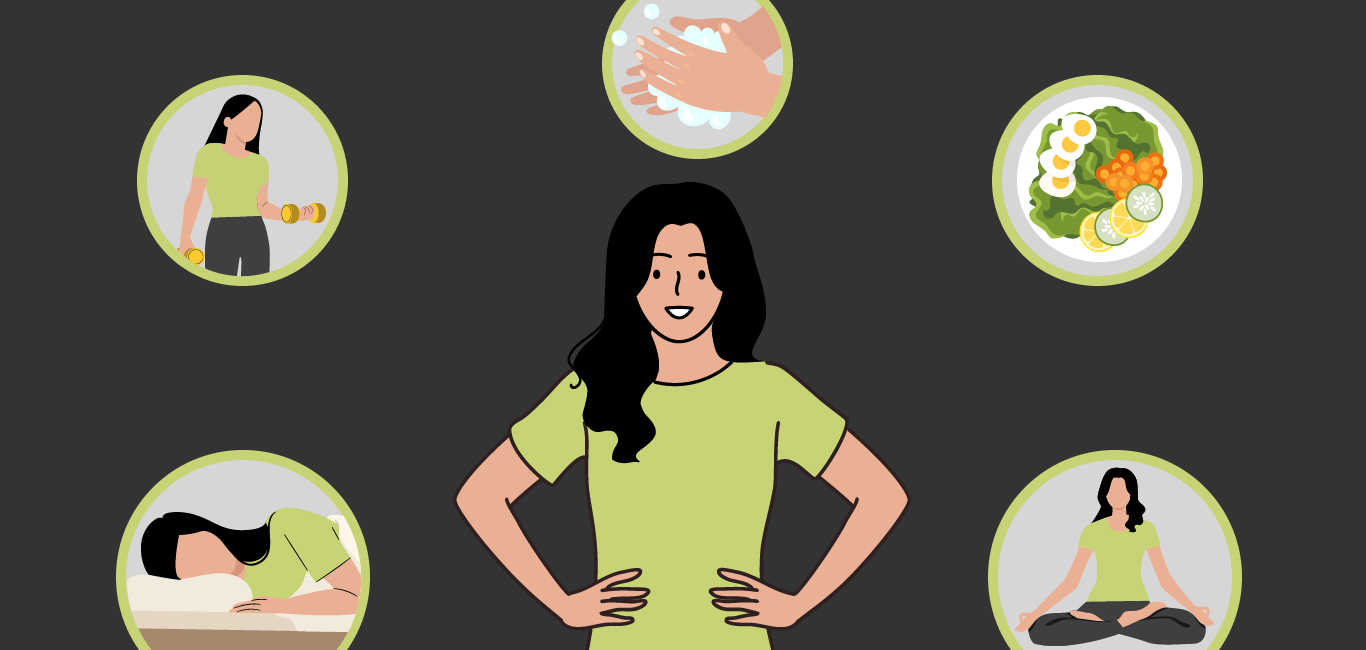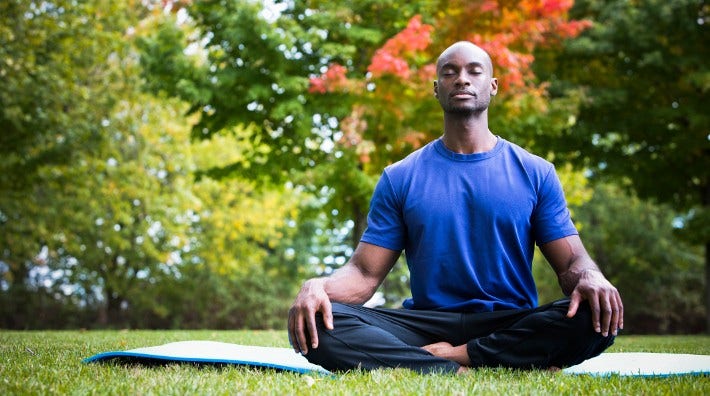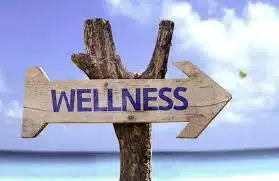Living a balanced life is a journey that needs focus on many wellness areas. The Substance Abuse and Mental Health Services Administration’s (SAMHSA) Wellness Initiative aims for a future where people with mental or substance use issues find health, happiness, recovery, and a good life in their community. Wellness covers emotional, physical, occupational, intellectual, financial, social, environmental, and spiritual parts, all linked together.
To have a balanced life, you need to make space for work, fun, relationships, exercise, and rest. Healthy habits like good eating, regular workouts, and enough sleep help your physical health and overall well-being. By taking care of these life areas, you can aim for a peaceful and rewarding life.
Key Takeaways
- Wellness includes many connected parts, like emotional, physical, and spiritual aspects.
- For a balanced life, you need time for work, fun, relationships, exercise, and rest.
- Healthy habits, like eating well, exercising, and sleeping enough, boost your physical health and happiness.
- Keeping harmony in life’s areas is key for a fulfilling life.
- The Substance Abuse and Mental Health Services Administration’s (SAMHSA) Wellness Initiative helps people with mental or substance use issues find health, happiness, recovery, and a good life in their community.
Understanding Wellness: A Comprehensive Approach
Wellness is more than just being healthy. It’s about looking at different areas of life that connect with each other. These areas include emotional, physical, occupational, intellectual, financial, social, environmental, and spiritual health.
The Eight Dimensions of Wellness
These eight areas work together for a balanced life. Emotional wellness is about handling feelings and bouncing back from tough times. Physical wellness means eating right, exercising, and taking care of your body.
Occupational wellness is about finding joy and meaning in your job. Intellectual wellness is about learning new things and keeping your mind sharp. Financial wellness is about managing money well and feeling secure.
Social wellness is about making strong connections with others. Environmental wellness looks at how our surroundings affect us. Spiritual wellness is about knowing what you believe and finding your purpose.
The Importance of Balance in Life
It’s key to keep all eight dimensions in balance for a balanced lifestyle and holistic well-being. If one area is off, it can affect others, leading to stress or health issues. By focusing on each area, you can live a more fulfilling and satisfying life.
Keeping balance means checking your priorities and changing your routine as needed. It’s about making time for different activities and taking care of yourself. This helps you keep all the dimensions of wellness in check.
“Wellness is not just the absence of illness, but a state of complete physical, mental, and social well-being.” – World Health Organization
Embracing Support from Others

Connecting with others who have gone through similar things can greatly help one’s well-being. Support groups offer a place for social support, empathy, and advice from those who get what you’re going through. These support groups give more than emotional help; they also connect you with resources and services you might not have known about.
The Benefits of Support Groups
Being part of a support group has many benefits for those looking to get better. Key advantages include:
- Getting support and advice from different people and views
- Helping others who are going through the same things
- Finding resources, services, and info to help on your journey
Support groups can be found in many places, like community groups, religious centers, or volunteer work. Joining these community connections helps you feel like you belong and gain from the knowledge of others who have been there before.
| Benefit | Description |
|---|---|
| Emotional Support | People can share their stories, get empathy, and feel understood by others in the same boat. |
| Practical Advice | Members share useful tips, strategies, and resources to tackle challenges. |
| Sense of Community | Support groups create a feeling of belonging, cutting down on loneliness and offering a supportive network. |
By using the strength of social support and linking with others facing similar issues, people can find great resources and support. This helps improve their overall wellness and happiness.
“The greatest gift we can give one another is the gift of listening.” – Rachel Naomi Remen
Establishing Routines and Healthy Habits
Creating daily routines and healthy habits can greatly improve our well-being. These habits boost our productivity and bring balance to our lives. They help us feel more energetic, happy, and connected with others.
Having daily routines helps us handle stress and anxiety better. A structured schedule gives us control and predictability, especially during tough times. Healthy habits like exercise, mindful eating, and regular sleep help reduce stress.
Daily routines and healthy habits also make us more productive. They help us organize our tasks and add wellness activities to our day. This improves our focus and helps us reach our goals, making us feel accomplished and satisfied.
Starting wellness routines and habits takes some work at first. But the benefits over time are huge. By making a system that fits our values and needs, we set the stage for a balanced and rewarding life.
Developing Consistent Routines
Having a consistent morning and evening routine is key to our well-being. Important parts of these routines include:
- Waking up and going to bed at the same time every day
- Adding a mindful practice, like meditation or journaling, to your routine
- Eating a healthy meal as part of your daily habits
- Setting aside time for physical activity, like a workout or a walk
- Reducing screen time and making your bedtime area relaxing
Cultivating Healthy Habits
Healthy habits can also boost our well-being and productivity. Good habits include:
- Drinking water throughout the day
- Eating a variety of nutrient-rich foods
- Doing regular physical activities, such as strength training or cardio
- Using stress management techniques, like deep breathing or mindfulness
- Reducing alcohol, tobacco, and other harmful substance use
By adding these routines and habits to our lives, we build a strong foundation for a balanced life. This leads to better well-being and productivity.
“The secret of your future is hidden in your daily routine.” – Mike Murdock
Physical Wellness: Nurturing the Body

Physical wellness is key to feeling good overall. By focusing on physical health, eating right, and staying active, you can live a balanced life. Healthy habits boost energy and help prevent diseases.
Nutrition and Healthy Eating
Eating well is crucial for staying healthy. Eating a variety of foods rich in nutrients helps your body work right. Include fruits, veggies, whole grains, lean meats, and healthy fats in your meals for a healthy lifestyle.
Watch how much you eat, cut down on junk and sugar, and drink plenty of water. Knowing how foods affect you can help you make better choices for your physical health.
Exercise and Physical Activity
Exercise keeps your body in top shape. Mix cardio, strength training, and flexibility exercises to boost heart health, muscle strength, and physical fitness.
- Do at least 150 minutes of moderate cardio or 75 minutes of hard cardio each week.
- Do strength training for all major muscles two to three times a week.
- Regularly do activities like stretching or yoga to improve flexibility.
Find fun ways to stay active and make it a habit. This helps you keep a healthy lifestyle and enjoy the perks of being active.
By eating well and exercising, you build a strong base for physical wellness. These habits bring more energy, a better mood, and a sense of life. They help you do well in every part of life.
Emotional and Mental Well-being

Keeping our emotional and mental health in check is key to feeling good overall. Stress can really hurt our physical, emotional, and social health. It can make our daily life harder. It’s important to learn how to handle stress to keep our emotional and mental health strong.
Stress Management Techniques
There are many ways to manage stress and boost our emotional and mental health. Here are some good techniques to try:
- Practice mindfulness and meditation: These can reduce stress, help you focus, and make you feel calm and peaceful.
- Engage in regular physical activity: Exercise is great for your emotional health. It can make you feel happier and less anxious or depressed.
- Prioritize self-care: Doing things that make you feel good, like sleeping well, eating right, and enjoying hobbies, is good for your mental health.
- Seek professional support: If stress is too much or gets in the way of your life, getting help from a therapist or counselor is a good idea. They can offer advice and support.
Adding these stress management tips to our daily life can help us handle life’s ups and downs better. This keeps us feeling emotionally and mentally healthy.
| Stress Management Technique | Benefits |
|---|---|
| Mindfulness and Meditation | Reduces stress, improves focus, promotes inner peace |
| Regular Physical Activity | Releases endorphins, alleviates anxiety and depression |
| Prioritizing Self-Care | Nourishes the mind, body, and soul |
| Seeking Professional Support | Provides personalized guidance and support |
“The greatest weapon against stress is our ability to choose one thought over another.” – William James
Using these stress management techniques can help us take care of our emotional health and mental well-being. This leads to a happier and more balanced life.
Wellness through Mindfulness and Meditation

Mindfulness and meditation are key for a balanced life. They help increase self-awareness and reduce stress. These practices are known for their benefits in emotional regulation and mental health. Mindfulness means being fully present in the moment. It helps us understand our thoughts and feelings better. This leads to clearer thinking and better handling of daily life.
Meditation is a focused practice that improves mental states. It helps with sleep, reduces anxiety, and boosts brain function. Regular meditation can make a big difference in our well-being. Adding mindfulness and meditation to your day can greatly improve wellness. It’s simple, like focusing on your breath or doing a guided meditation. These activities can be done alone or with family.
These practices are great for managing stress and improving emotional health. They help us understand ourselves better. By adding them to your life, you can find more balance and peace.
“Mindfulness is the aware, balanced acceptance of the present experience. It isn’t more complicated than that. It is opening to or receiving the present moment, pleasant or unpleasant, just as it is, without either clinging to it or rejecting it.”
– Sylvia Boorstein
Mindfulness and meditation together can greatly improve overall wellness. They help us become more aware of ourselves and our emotions. This leads to a more balanced and fulfilling life.
Social Connections and Relationships

Keeping strong social connections and healthy relationships is key to feeling good overall. Being around others, like family, friends, community groups, or work networks, makes us feel part of something bigger. It gives us support and happiness. Taking care of these social ties helps our emotional, mental, and physical health.
Spending quality time with those we care about and looking for ways to meet new people can make life better. Improving interpersonal skills like listening well, understanding others, and talking clearly can make our social wellness stronger. This helps us connect more deeply with people around us.
Joining a team, helping out with a cause, or being in a hobby group are great ways to make relationships and grow our social circle. These activities give us a sense of being part of a group. They also help us grow personally, support each other, and share new ideas.
“The quality of our relationships determines the quality of our lives.”
By focusing on social connections and healthy relationships, we can live a more balanced and fulfilling life. This approach to wellness boosts our overall health. It also helps us feel more connected to our community and belonging.
Intellectual and Occupational Fulfillment

Wellness is more than just physical and emotional health. It also includes our intellectual and work lives. Doing things that make our minds work harder, like learning new skills or reading, helps us feel purposeful and grow personally. Also, having a job that matters to us can make us happier and more fulfilled at work.
Keeping our minds sharp is key to a good life. Learning new things and staying curious can boost our creativity and make us feel proud of what we achieve. Whether it’s an online class, a book club, or a new hobby, these activities help us grow, see things differently, and improve our mental health.
Being happy in our jobs is also important for our well-being. When we love what we do, we feel less stressed and more driven. This kind of work makes us feel more whole and balanced.
By focusing on both our minds and our work, we can grow, find purpose, and feel fulfilled. This leads to more joy, less stress, and a better life balance.
“The purpose of our lives is to be happy.” – Dalai Lama
| Intellectual Wellness | Occupational Wellness |
|---|---|
| Engaging in activities that challenge the mind, such as learning new skills, reading, or pursuing hobbies. | Finding work that is meaningful and aligns with one’s values and abilities, leading to greater job satisfaction and overall well-being. |
| Continuous learning and intellectual stimulation can keep the mind sharp, foster creativity, and provide a sense of accomplishment. | Engaging in work that is meaningful and fulfilling can positively impact overall well-being and contribute to a more balanced life. |
| Nurturing intellectual wellness is essential for a balanced life. | Achieving occupational wellness is another crucial aspect of holistic well-being. |
- Pursue intellectual activities that challenge your mind and foster personal growth.
- Seek out work or career opportunities that align with your values, skills, and passions.
- Engage in continuous learning and skill development to enhance your intellectual wellness.
- Strive to find a career that provides a sense of purpose and fulfillment.
- Maintain a balance between intellectual pursuits and occupational responsibilities for a well-rounded life.
By embracing both intellectual wellness and occupational wellness, individuals can embark on a journey of personal growth, fulfillment, and a more balanced approach to life.
Financial Wellness: Managing Resources

Financial wellness is key to feeling good overall. Managing money well, like handling debt, saving, and budgeting, can lower stress. It also gives you a sense of security and control over your life. By making smart money choices, you can improve your financial balance and stability. This can also help other areas of your well-being.
To start with financial wellness, understand money management basics. A detailed budget can help you keep track of your money. It lets you see where you spend and save. By cutting back on unnecessary spending, you can save more for your goals, like paying off debt or saving for the future.
Keeping a good credit score is also important for financial wellness. This means checking your credit reports for mistakes and paying bills on time. By watching your credit closely, you can get better deals when you need to borrow money or apply for financial products.
| Financial Wellness Indicators | Healthy Range |
|---|---|
| Debt-to-Income Ratio | Less than 30% |
| Emergency Fund | 3-6 months of living expenses |
| Credit Score | Good (700+) |
Having an emergency fund is vital for financial wellness. It helps you handle sudden money problems, like losing a job or unexpected medical bills, without going into debt. Experts say to aim for savings that cover 3-6 months of your expenses.
By focusing on financial wellness, you can feel more in control of your life. You’ll reduce stress and set the stage for a better future. With good budgeting, credit management, and saving for emergencies, you’re taking steps towards financial security and well-being.
“Financial wellness is not just about money, it’s about having the resources and confidence to live your best life.”
Environmental Wellness: Creating Healthy Surroundings
Our environment greatly affects our wellness. It shapes the air we breathe and the places we live. By focusing on environmental wellness, we can live more sustainably and mindfully. This leads to a balanced life.
Designing and organizing our living spaces is key to environmental wellness. A clean, tidy home or workspace boosts feelings of control and focus. Adding natural elements like plants and natural light connects us to nature. This improves our overall well-being.
Living sustainably is also vital. Using eco-friendly materials and energy-efficient appliances helps reduce our impact on the planet. It makes us feel more responsible and purposeful. By thinking about the future, we create healthy living spaces that match our values and help the planet.
Environmental wellness means making our surroundings nurturing and supportive. By living mindfully and sustainably, we gain more control, connection, and balance. This leads to a more complete approach to wellness.
| Sustainability Practices | Benefits |
|---|---|
| Energy-efficient appliances | Reduced energy consumption and utility costs |
| Recycling and waste reduction | Minimized environmental impact and increased resource conservation |
| Sustainable building materials | Improved indoor air quality and reduced carbon footprint |
| Renewable energy sources | Lower reliance on fossil fuels and increased self-sufficiency |
“The health of the planet and the health of the individual are one and the same.”
– Deepak Chopra, author and wellness expert
- Assess your current living space and identify areas for improvement.
- Incorporate natural elements, such as plants, natural lighting, and access to outdoor spaces.
- Prioritize sustainable and eco-friendly practices in your daily life.
- Regularly declutter and organize your living and working environments.
- Educate yourself and others about the importance of environmental wellness.
By embracing environmental wellness, we can make healthy living spaces. These spaces nourish our bodies, minds, and souls. This leads to a more balanced and sustainable life.
Wellness: A Lifelong Journey
Living a life of wellness is a journey that keeps changing. Our lives, needs, and situations change over time. So, the ways we take care of ourselves must change too. Seeing wellness as a journey, not just a goal, helps us stay flexible and open to growing.
By always checking and changing our wellness plans, we make sure we meet our changing needs. This way, we live a balanced and happy life. Being open to change and always trying to get better helps us handle life’s ups and downs.
Wellness isn’t the same for everyone; it’s very personal. It needs self-knowledge, patience, and trying out different things. As we grow, our wellness needs change, so we must be open to new ways of staying healthy.
Seeing wellness as a journey helps us understand ourselves better. It lets us make smart choices and change our habits when needed. This leads to feeling more fulfilled and well.
“Wellness is a way of life, a lifestyle you choose to lead, not just something you do.”
The journey to wellness isn’t straight; it has ups and downs. With an open mind and a commitment to getting better, we can face it with ease. This way, we live a more vibrant, balanced, and happy life.
Also Read : Embracing Palliative Care For Quality Of Life
Conclusion
For a balanced and fulfilling life, we must look at all aspects of wellness. This includes physical, emotional, mental, social, intellectual, financial, environmental, and spiritual health. By focusing on these areas, we start a lifelong journey of growth and well-being.
It’s important to build healthy habits and get support from others. Mindfulness and stress management are key. Also, keeping strong social connections and updating our wellness habits are vital. This way, we can live a balanced lifestyle and improve our daily life quality.
Chasing wellness is a personal journey that never stops. It needs dedication, flexibility, and a readiness to accept life’s changes. By sticking with it, we can live a life full of energy, happiness, and deep balance.
FAQs
Q: What is wellness?
A: Wellness is the state of being in good health, both physically and mentally, encompassing various aspects such as nutrition, exercise, mindfulness, and emotional well-being.
Q: How can wellness practices benefit my overall health?
A: Engaging in wellness practices can improve your quality of life, boost immunity, reduce stress, and increase your energy levels.
Q: What is the Global Wellness Institute?
A: The Global Wellness Institute is an organization that conducts wellness industry research and provides valuable insights into the latest trends and developments in the field of health and wellness.
Q: How can I change my habits to improve my well-being?
A: You can change your habits by incorporating healthier routines such as regular exercise, balanced nutrition, sufficient sleep, and stress management techniques into your daily life.
Q: How does changing your habits impact your life?
A: Changing your habits can lead to a significant improvement in your overall health, productivity, mood, and longevity.
Q: What is the importance of preventive wellness measures?
A: Preventive wellness measures can help you avoid potential health issues, reduce healthcare costs, and enhance your overall well-being in the long run.
Q: How can I incorporate wellness practices into my daily routine?
A: You can integrate wellness practices into your daily routine by setting specific goals, creating a wellness plan, establishing a support system, and staying consistent with your efforts.





